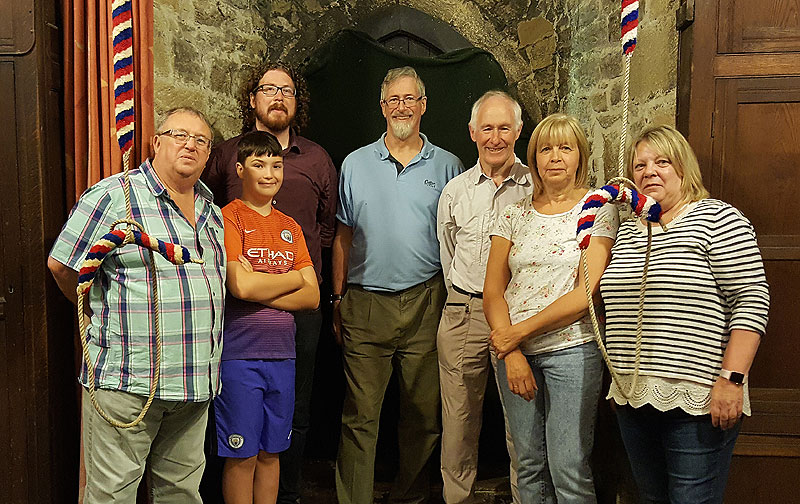Recruitment and retention resources
4. Training and retaining your recruits
4.5. Learning in groups
Group learning provides two key benefits to new ringers – peer support and a feeling of being invested in and hence valued. And that investment pays off; retention rates are higher when people are taught together.

Recruit and teach new ringers together in a group
Teaching a group of three or more new ringers in the same tower, at the same time, provides a group learning experience. This can be more disruptive to the existing ringers, however if the band has become depleted over the years this is less of an issue; in fact there is little choice.
What you notice is the atmosphere in the tower. There is a real buzz – coming from the sense of camaraderie and achievement that such projects generate. People don't stop coming because they don't think they are making any progress or because they are holding other ringers back. They see the other new ringers going through low points just as they do and support each other through them.
Centralised bell handling teaching
Teaching one or more new ringers at a central teaching tower minimises disruption to existing practices, allows good, enthusiastic bell handling teachers to teach more new ringers (more efficient use of skills) and can provide the benefits of a group learning environment
A number of models exist. The simplest consists of a single bell handling teacher who teaches all the new recruits for the other towers in the benefice. New recruits are trained to a high standard and then fed into surrounding towers with supportive bands and good teachers to take them on into method ringing. A network of ringers is created across all the towers with different teachers and skills being utilised throughout the learning process. At the other extreme is the Ringing School in which small groups of ringers are developed at a central tower, starting with learning to handle a bell to ringing methods.
Partnership and trust are key. Teachers invest a lot of time teaching new ringers who won't be members of their band, so they need to know that the bands that these ringers go onto ring with, will be able to develop and retain them when they are passed on. On the other hand, these towers must trust the teachers not to poach their new recruits!
Groups of towers working together
Groups of towers can form a hub or cluster or ringing centre. The group offers multiple practices, some of which can be targeted. For example each tower might not be able to run a youth practice, but together they could. The same for an advanced practice. Ringers can go to practices which fit in with their work and family schedules and change as these change, without feeling they are deserting their home tower or stopping ringing because of shyness.
Group learning is encouraged by the targeted practices and the scale of the group, providing the peer support and a feeling of being invested in, which are key to keeping new ringers ringing. And that investment pays off; retention rates are higher when people are taught together.
Foundation skills practices and workshops
In the same way special dedicated practices are organised for method ringing, successful towers also organise entry-level practices and workshops to develop foundation skills. This can be on a separate evening, or fortnightly on a weekend. If you advertise it locally it will almost certainly be of interest to new ringers from the whole area. Word spreads quickly and such practices become very popular. So be careful, you want enough to have a vibrant practice but not too many that the ringers for whom you set up the practice, don't get enough time on the end of the rope.
Encourage your ringers to form a group using social media, outings and social events.
What do ringers and teachers say?
One of the most important aspects has been able to learn alongside people at a similar level of ringing. Peer support throughout the groups has been fantastic and as an older learner does make you realise that everyone has similar concerns and that no one is too old to get involved with something completely different.
I would have given up long ago. Thank you to all the helpers and to my fellow students for their help and support.
A decision needs to be made by the whole band though: it is a big time commitment and not just by the one or two people specifically teaching the learners, especially if you have more than a couple of learners: which I think was helpful as they were able to support and learn from each other.
